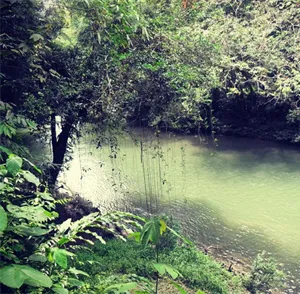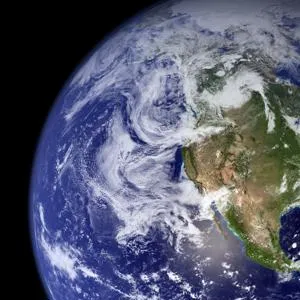We are facing a host of existential threats to our world that require informed responses and innovative solutions. In order to achieve this, we need to ensure that current and future leaders as well as the wider public have an in-depth understanding of the nature, scale, complexity and interdependence of these threats
09 November 2021
School of Security Studies to offer new modules exploring security implications of climate change
Read about our new educational modules being developed to enhance knowledge of climate and security

New educational modules are being developed on climate change and security by members of the Environmental Security Research Group (ESRG) in the School of Security Studies.
These modules will help BA and MA students across various programmes to increase their awareness of both the complex and far-reaching security implications of climate change and environmental destruction, as well as potential solutions and opportunities for mitigation and adaptation.
Dr Maeve Ryan, Co-Director of the Environmental Security Research Group, said:
In line with these challenges, a series of newly developed educational offerings are set to be delivered over the coming year, from a new BA module for War Studies students through to an MA Special Subject for military officers at the UK Defence Academy.
Environmental security – new modules

As part of its commitment to increasing undergraduate awareness of key environmental security and IR challenges, starting in 2023 the Department of War Studies will also be running a new module for Year 3 BA students entitled 'Nature’s Evil? Natural Resources in Global Politics’.
The module builds on ongoing collaborative cross-university research on the ways in which shifts in the exploitation of resources across different historical periods have had pronounced geopolitical, economic, legal and social repercussions, including environmental and ecological degradation.
The module lead, Professor Joe Maiolo said:
We’ve been working for some time on projects that explore how changes in the exploitation of natural resources have shaped global politics. It’s really exciting to be able to bring some of those insights to students in a new and focused way.

MAs in the Department of War Studies
A new module: 'Environmental Security: an interdisciplinary approach' has also been created by Dr Richard Milburn for students on any of the MA courses in the Department of War Studies. The module provides an overview of the varied issues within the environmental security field, such as climate change, the illegal wildlife trade, water wars, and the environmental impact of armed conflict on the environment. Students gain an enhanced understanding of the multiple security threats and threat multipliers that environmental loss and climate change create.
It also examines the politics of nature conservation, analyses the economic drivers behind environmental loss, and critiques current and historical approaches to protecting the environment to understand how to better communicate the importance of environmental security and enable change.
Seminars focus on practical exercises, including war-game scenarios, to bring the topic to life, and creative projects to encourage out-of-the-box thinking, vital to success in civilian and military endeavours. Students also have the opportunity to conduct deep-dives into particular areas of interest of their choice for their assignments.
As the effects of environmental security become more widely understood and accepted, these new modules will help War Studies students as they go onto careers in both the civil and military fields, providing insights and knowledge that are in-demand in an ever increasing variety and number of roles.

UK Defence Academy's Advanced Command and Staff Course
Starting in January 2022, the Defence Studies Department will also start delivering a special MA elective on environmental security for UK and international military officers attending the UK Defence Academy's Advanced Command and Staff Course. This will provide interactive learning tailored to the potential future roles of senior military officials in relation to climate and environmental crises. The elective is also designed to help students develop policy-relevant outputs on the governance and security implications of environmental shifts, as well as the potential role of security forces in supporting global mitigation and adaptation goals.
As noted by the module lead, Dr Duraid Jalili:
We’re seeing a clear surge in the level of concern felt across our military students on the implications of and potential responses to climate change, biocapacity and biodiversity loss. Although we’ve been engaging with the environment as a key variable across our courses for some time, it’s great to be able to deliver a more concentrated module with impact-led outputs.

The School of Security Studies is launching a new MA in Global Security in January 2022. The programme is run jointly by the Defence Studies Department and the Department of War Studies. With a global perspective in mind, students will explore systemic threats to diverse aspects of human security through the lenses of the 'Global South' and the 'Global North'. Students will be equipped with the conceptual tools to critically analyse, and develop innovative solutions to, a wide-ranging set of challenges, including climate change and the reduction of biodiversity, geopolitical contests, global governance, human rights and justice, which connect the global with the local and the individual, from policy elites to marginalised people.
As part of this new MA, from September 2022 students on the course will be able to take the Global Security Challenges module. Developed by Drs Cathy Scott and Duraid Jalili, the module provides insights and understanding on the concept of global security challenges, including key trends in global health, climate change and biocapacity loss and the related threats to security and human welfare, as well as the key issues that impact the prospects for positive change.

Open-Source Offerings
In addition to these specific modules, members of the ESRG are working together to develop and distribute open-source roleplaying scenarios on climate security, to provide new experiential insights into the challenges faced by stakeholders, from security responses to climate threats through to diplomacy and negotiation issues in global climate governance.
Dr Richard Milburn, the group’s lead developer for war gaming in environmental security, said:
It's vital that we democratise access to education beyond King’s. These kinds of open-source roleplaying scenarios provide a unique and highly interactive method for enhancing understanding on environmental security risks, challenges and prospective solutions to the widest possible range of officials.
Dr Richard Milburn
This sentiment was reiterated by co-Director of the ESRG, Dr Duraid Jalili:
What the Environmental Security Research Group has really highlighted is that there is a real passion amongst our educators to deliver research-led, innovative education on environmental security issues. This is innately tied in with a drive to reach as broad an audience as possible, from young environmental advocates seeking to drive radical and research-led change, through to senior security officials seeking to understand and implement the changes required. It’s this diversity and breadth of reach that is key to achieving genuine progress in environmental security.
Dr Duraid Jalili





